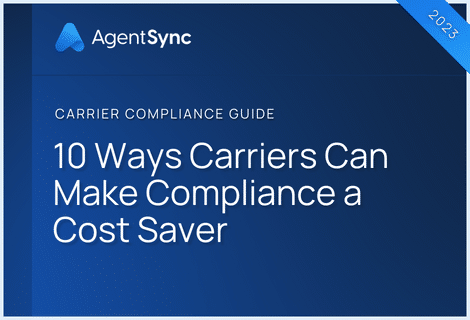

The National Association of Insurance Commissioners (NAIC) Insurance Summit 2023 in Kansas City was a meeting of the minds, as regulators and industry players came together to discuss the hot topic of insurance regulation in mid-September.
If you’d like to read the five key takeaways from the conference, we’ve rounded that analysis here, but if you want to hear about what regulators talk about (besides their dogs, kids, houses, and pickleball) during these things, you’ve come to the right place.
While these conferences are full of real, useful information – you find very little fluffery and sales pitches on the stages at the NAIC conference – some of the more eye-opening conversations are those that happen outside. Insightful thoughts shared over burnt ends at lunch, bits of regional insurance flavor bandied about between approving comments about the caramel churros.
Since the AgentSync blog is “press,” we couldn’t sneak into the regulatory sessions, either, but we can give you the broad strokes of what was on regulators’ minds.
Regulator-only NAIC Insurance Summit sessions
Most sessions at the NAIC are open to everyone, and are denoted by interest tracks so you can follow topics like communications, producer licensing, antifraud, policy research, etc. But a handful of sessions are closed to the public and reserve attendance for only the regulators themselves.
Before sessions even started, the NAIC was sharing State Based Systems (SBS) changes with the regulators with State Based Systems Overview and Tableau Reporting Demo and the State Based Systems and the Enterprise Data Platform.
At the conference, you can see regulators spent a good bit of time collaborating over NAIC tools, state accreditation, rate models, and tech, with a healthy dose of social justice, climate change, and cybersecurity thrown in with regulator-only sessions like:
- New NAIC BI Tool (ThoughtSpot) Demo
- Financial Analysis Update
- Connecting the Dots: Empowering State Regulation through Accreditation
- Navigating the Accreditation Program: Clearing the Path to Regulatory Excellence
- State-Based Systems Payment Portal and Invoicing
- Climate-U.S. Insurer Transition Risk 3.0
- Common Deficiencies in Rate Models and How to Address Them
- TeamMate+ Transition Update
- Accessing and Using Data in the NAIC Enterprise Data Warehouse
- Deconstructing Advanced Models
- Auto Insurance Ratings and Social Justice Issues
- A Discussion of Network Adequacy and Preliminary Results from the CIPR Project
- Cybersecurity Series: Is the Insurance Sector a Target 3.0?
Out of context: Notable quotes from NAIC presentations
The presentations are often so rich and thought-provoking (or, occasionally, totally snoozeworthy) that it’s hard to capture a whole session, let alone the entire conference, but a few contextualized quotes will have to do:
“We have rising national debt – this is a huge problem, but symptoms are invisible until they’re horribly painful… It’s better to suffer a moderate recession now as opposed to a more costly one later.” – Thomas Hoenig, former President and CEO of the Federal Reserve of KC, Outlook on the U.S. Economy
“NIPR is to producer licensing as H&R block is to taxes. You are confident their system has all the rules built in for you to file your taxes. They don’t make the rules, but they can move your transactions with those rules built in.” – Karen Stakem-Hornig, CEO of NIPR, Uniformity in Producer Licensing
“What we will discuss here is outdated.” – John Keddy, Datos-Insights, AI in the Insurance Industry
“Insurance is a business based on historical data, but… things are not reverting to the mean. Historically, 2023 was the worst P&C market, and looking to 2024, people want to know, ‘Will this continue?’” – Matthew Nielsen, Global Governmental and Regulatory Affairs at RMS, The Broad Impact of Natural Catastrophe
“Thirty years ago we were having conversations about diversity in the workplace and we were talking about it as ‘understanding diversity;’ now the conversation has shifted to learning about and acting against unconscious bias,” – Evelyn Boswell, Director of Diversity Equity and Inclusion for NAIC, Contemporary Diversity, Equity & Inclusion (DEI) Topics in the Insurance Industry – Insights and Actions for Leaders
“Talk about your diversity story. If you don’t think you have a diversity story, I think that might be your diversity story.” – Susan Johnson, Chief Diversity, Equity, and Inclusion Officer at The Hartford, Contemporary Diversity, Equity & Inclusion (DEI) Topics in the Insurance Industry – Insights and Actions for Leaders
“Cybersecurity is a national security risk. … Our customers have a list of measures we expect them to take and we assess their security protocols to provide coverage. Coalition has 64 percent fewer claims than the broader market.” – Sezaneh Seymour, Vice President and Head of Regulatory Risk and Policy at Coalition Inc, What’s Happening in InsurTech?
“There’s never a good time for a wildfire, but with the pandemic and home values increasing, houses increased by hundreds of thousands of dollars in value… Our immediate concern was underinsurance. Within days and weeks of the events people realized they didn’t have good information from insurers and agents about what’s in their policies. … The term ‘wildfire’ isn’t helpful, it conjures up something that happens in the mountains, in a deep pine forest… this was the suburbs.” – Vincent Plymell, Assistant Commissioner for Communications & Outreach for Colorado Division of Insurance, speaking about the 2021 Marshall Fire in Wildfire Panel—How Catastrophic Loss Activity Affects Property Insurance Markets
“Mother nature requires that wild lands burn. It’s how you keep the prairie the prairie. But how can we keep wild lands wild without conflagrating the burbs?” – Anne Cope, Chief Engineer of the Insurance Institute for Business & Home Safety (IBHS), Wildfire Panel—How Catastrophic Loss Activity Affects Property Insurance Markets
“Consumers can choose how their data is being used – insurers definitely need to give them the ability to change their personal data for accuracy but part of our goal is to also give them the ability to decide if they want to work with a company that uses data the way the consumer approves.” – Cynthia Amann, NAIC Executive Liaison and Marketplace Coordinator at the Missouri Department of Insurance, Understanding the New Consumer Privacy Protection Model Law
“By having a backlog of business, you’re already lost because you’re more concerned about processing business fast than screening for fraud.” – Alan Haskins, Head of North America Insurance Strategy and Innovation of Quantexa, The Advancement in Technology and Innovation for Detecting and Preventing Insurance Fraud
“We’re waiting on final guidance on implementing some of the newly finalized federal rule, which will come soon. CMS and the DOL love that word, ‘soon.’ What does it mean? It means more than a week.” – Brian Webb, Assistant Director for Life and Health Policy and Legislation for the National Association of Insurance Commissioners, Health Insurance Hot Topics
“This is a federal system and the fact that we work from the bottom-up is important… there are moments when events force topics upon us. For us, George Floyd certainly pushed us to consider priorities of DE&I, but there’s also AI, data privacy, data ownership, there is so much that’s happening, and insurance is constantly changing because society is constantly, rapidly changing.” – Andrew Mais, Connecticut Insurance Commissioner and NAIC President-Elect, NAIC Officer Panel
“It is still vital to help consumers understand what it is that they’re buying – that has not changed.” – Chlora Lindley-Myers, Director of the Missouri Department of Commerce and Insurance and NAIC President, NAIC Officer Panel
“As an industry, we’re touching every area of the economy but, as far as consumers, we’re meeting people oftentimes on their worst day.” – Jon Godfread, Commissioner of the North Dakota Insurance Department and NAIC Vice President, NAIC Officer Panel
Notes from casual conversations on the ground
Some of the best conversations about insurance regulation happened at mealtimes and downtimes, as people shared daily minutia over coffee and little fruit pastries.
Industry examiners chatted after hours, estimating that the majority of examinations they conduct are on insurers that are trying to stay compliant (even though it is sometimes painfully hard when working across states). They agreed P&C insurers often get in the most trouble when they aren’t following their own stated guidelines for underwriting and deciding risk.
Another regulator expressed the difficulties of moving from working inside the industry to working on the regulatory side, and how, to their observation, too few regulators had work experience on the other side of the desk. They saw firsthand why some – to their mind – impractical regulatory frameworks were in place, when regulators didn’t have the experience to see what the impact would look like “on the ground,” so to speak.
A table of regulators over lunch one day expressed the difficulties of maintaining morale when political ideology might affect their employment, as changing administrations take different positions on DOI budgets and enforcement priorities. They compared differences between commissioners who are appointed vs. those who are elected, and whether that changes the dynamics of an office (spoilers, anyone whose department lead could change due to election or appointment based on the mood of the electorate or governor feels a bit insecure in an election cycle!).
One government worker expressed frustration that members of the public often have an image of state employees as working lazy, easy jobs. “The people in my office take work home. They log odd hours. They are some of the most hardworking people I’ve ever known,” they said.
Many attendees noted that the insurance industry as a whole provides general work-life balance. While certain seasons full of storms, wildfires, or political situations necessitate wild hours, on the whole, insurance careers provide well-ordered and adequately prioritized paces of life.
At AgentSync, we generally agree. If you’re with an agency, MGA, MGU, or carrier that would like to see how to make your employees’ lives even more enjoyable by stripping the manual repetitive pieces of compliance out of their workload, see how AgentSync can help.

